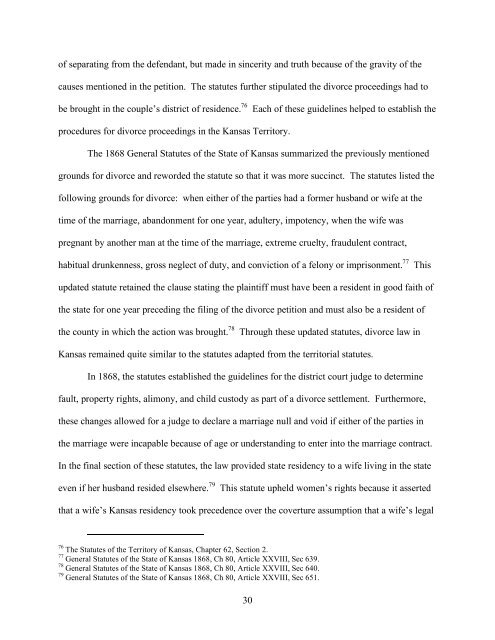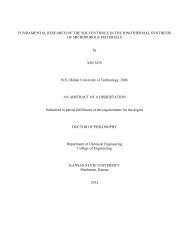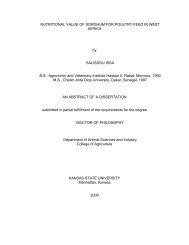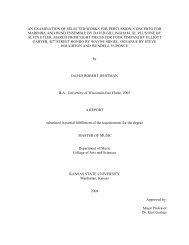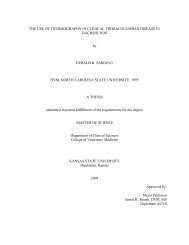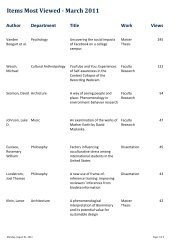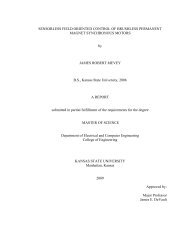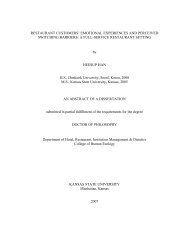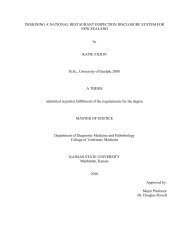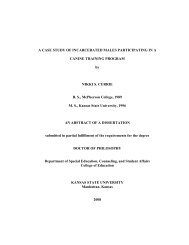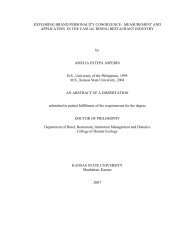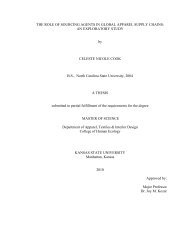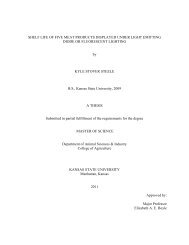SELFISH INTENTIONS - K-REx - Kansas State University
SELFISH INTENTIONS - K-REx - Kansas State University
SELFISH INTENTIONS - K-REx - Kansas State University
Create successful ePaper yourself
Turn your PDF publications into a flip-book with our unique Google optimized e-Paper software.
of separating from the defendant, but made in sincerity and truth because of the gravity of the<br />
causes mentioned in the petition. The statutes further stipulated the divorce proceedings had to<br />
be brought in the couple’s district of residence. 76 Each of these guidelines helped to establish the<br />
procedures for divorce proceedings in the <strong>Kansas</strong> Territory.<br />
The 1868 General Statutes of the <strong>State</strong> of <strong>Kansas</strong> summarized the previously mentioned<br />
grounds for divorce and reworded the statute so that it was more succinct. The statutes listed the<br />
following grounds for divorce: when either of the parties had a former husband or wife at the<br />
time of the marriage, abandonment for one year, adultery, impotency, when the wife was<br />
pregnant by another man at the time of the marriage, extreme cruelty, fraudulent contract,<br />
habitual drunkenness, gross neglect of duty, and conviction of a felony or imprisonment. 77 This<br />
updated statute retained the clause stating the plaintiff must have been a resident in good faith of<br />
the state for one year preceding the filing of the divorce petition and must also be a resident of<br />
the county in which the action was brought. 78 Through these updated statutes, divorce law in<br />
<strong>Kansas</strong> remained quite similar to the statutes adapted from the territorial statutes.<br />
In 1868, the statutes established the guidelines for the district court judge to determine<br />
fault, property rights, alimony, and child custody as part of a divorce settlement. Furthermore,<br />
these changes allowed for a judge to declare a marriage null and void if either of the parties in<br />
the marriage were incapable because of age or understanding to enter into the marriage contract.<br />
In the final section of these statutes, the law provided state residency to a wife living in the state<br />
even if her husband resided elsewhere. 79 This statute upheld women’s rights because it asserted<br />
that a wife’s <strong>Kansas</strong> residency took precedence over the coverture assumption that a wife’s legal<br />
76 The Statutes of the Territory of <strong>Kansas</strong>, Chapter 62, Section 2.<br />
77 General Statutes of the <strong>State</strong> of <strong>Kansas</strong> 1868, Ch 80, Article XXVIII, Sec 639.<br />
78 General Statutes of the <strong>State</strong> of <strong>Kansas</strong> 1868, Ch 80, Article XXVIII, Sec 640.<br />
79 General Statutes of the <strong>State</strong> of <strong>Kansas</strong> 1868, Ch 80, Article XXVIII, Sec 651.<br />
30


